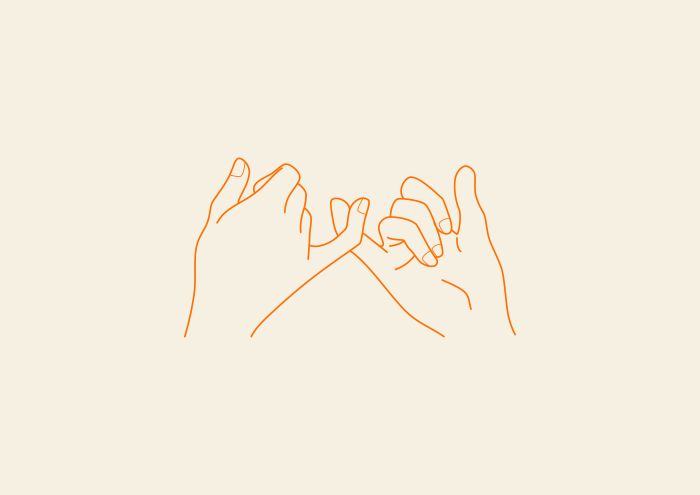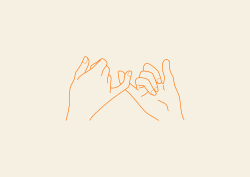Linda’s experience with PMDD and postpartum depression: “I knew I wasn’t crazy”
Linda Balk (38) has had PMDD ever since she was sixteen, but after years of searching, it was only in 2016 that she found out what was actually wrong with her. She felt relieved because there was an actual cause for all her symptoms and she finally had the confirmation: “I knew I wasn’t crazy.” But at the same time there was this sense of sadness, because it took her so many years to find out, “How different could my life have been if I had known this sooner?”
In almost everyone's cycle there are days where you just don’t quite feel like yourself. When, during your period, your negative thoughts are 100 times more intense than usual, that’s PMS. If you intensify that by a 1000 you’ll get PMDD: the most severe form of PMS. Women with PMDD can feel hopelessly depressed, scared, irritable, tense and sometimes even suicidal. PMDD moves along with your menstrual cycle, so that means that women with PMDD have a period during their cycle where they feel perfectly fine, but then the ‘fun’ starts all over again.
Doctors struggle to give the diagnosis PMDD. That’s because it’s an endocrine disorder, but most symptoms express themselves psychologically. This results in many doctors often looking in the wrong place for the cause of PMDD. It took Linda 20 years before she finally found out what was wrong with her. “In 2016 my husband showed me an article about PMDD because he thought the symptoms described in the article were awfully familiar to the symptoms I’ve had to deal with since puberty. I was full of disbelief and relief when I read it: it all finally made sense. I‘ve had incredibly severe mood swings ever since I was sixteen, and there were times I was feeling so bad I wanted to end my life. But this always changed after a few days and I’d feel like I was on the top of the world again. It was all very confusing.”
Linda’s childhood was safe and warm, and no topic was off limits in her family. But it wasn’t all sunshine, she was bullied during elementary school because of her timid and sensitive nature. “When I went to high school I could make a fresh start. I made new friends and I had the time of my life. But this all changed when I turned sixteen. I felt like I was different from the rest, like I couldn’t fit in. But I could also be super cheerful. I thought these mood swings were caused by my trauma of being bullied during childhood.”
"I was so embarrassed"
The timid teenager successfully finished her secondary education and went on to a university of applied sciences at the age of sixteen. Things were going well for Linda, but it all went downhill during her internship. “I had good and bad days, but the bad days were so bad that I wasn’t able to go to work or when I did go I would just sit there crying in the office. I started to make more and more excuses or let my mom call in sick for me because I was so embarrassed for myself. Everybody was understanding but I just couldn’t accept that this was happening to me, I was my own worst enemy.”
“When I started working I couldn’t hold down a job for long and at every place I worked at I was known as the girl you couldn’t count on. I wasn’t able to work for at least two weeks, every single month. I always tried to push through, but in the end I’d always be running on fumes. This caused me to eventually develop other ailments such as arrhythmia. I felt so sad about this because there’s nothing I’d rather be doing than my job. When my contract wasn’t renewed my heart was broken. Looking back I can understand why my boss didn’t want to keep me around, nobody wants an employee who is often sick and doesn’t fit in with the rest of the team. But I felt so incredibly rejected at that time: my colleagues were like my family and it felt like they didn’t want me anymore. And I also knew that they just hadn’t had the chance to see the real, happy and social me.”
Linda decided to start her own business, this way she could manage her own time and plan according to her good weeks. Even though she didn’t have a diagnosis yet, Linda noticed she always had good and bad weeks at certain times. In 2014 her online marketing company Purple Curve was born. “I never imagined it would do so well. All I had to do was keep myself and my customers happy. When I wasn’t feeling my best, I could put things off until I was comfortable in my own skin again. I am a professional, very good at my job and my story caught on.”
In the meantime, the pattern of her PMDD symptoms were becoming more noticeable. “It starts with an irritable feeling, which turns into worrying and fretting, and extreme anger. Multiple things have been thrown across the room and I even broke a car window because I threw my phone at it. I was in a loving relationship but I was so unreasonably mean to him. ‘I hate you so much, you can go to that stupid-ass diner at your parents by yourself,’ I’d snap at him for example. And when he’d actually go, I’d be even more pissed because he left me all alone. Each time there were these intense feelings of sadness, worthlessness and insecurity.”
“One day when my husband mentioned that article about PMDD, I finally saw the light and I started keeping track of my cycle. It turned out that, without fail, I would feel my worst around my ovulation period. At the end of 2017 I got pregnant and I was practically on cloud nine for those nine months with the way I was feeling. No depression, no anger, the evil witch inside me was gone. That moment I realised that everything was the fault of those fucking hormones. During my pregnancy I got to know who I really was and I could finally start loving myself.”
People with PMDD have a higher chance of getting postpartum depression. Linda was convinced this wouldn’t happen to her, but she was proven wrong after it already went south during the postpartum period: “I felt myself slipping away. Our son was crying all the time. I was struggling with breastfeeding so I would pump 7 times a day. I never had time to sleep. Everybody told me: ‘It’s gonna be alright,’ but it didn’t turn out alright. It felt like my heart was locked and the keys were lost. It felt like my son would cry on purpose just to torture me. It drove me crazy and all I could think was: ‘get him out of here’. I started to lose touch with myself, and the people around me started to notice it. When there was a rare moment I did fall asleep, the baby would wake up and everything would start from the beginning again. One day I just had enough of it. I fell to my knees and could only scream: STUPID CHILD. I put him down in bed even though he kept crying and I sat down on the couch with a bottle of wine.”
The GGZ (mental health care) crisis service was called in for Linda. Home visits, heavy antidepressants, lots of sleep and intensive therapy followed. “I had been so out of it and the guilt was eating me alive. I fell into a deep depression, which felt like PMDD, but every hour of every day and 10 times worse.’ After 10 months Linda’s cycle started again and things were looking up. “My little boy is 2 years old, but only now can I truly say that I feel like a mother. He is the best thing that has ever happened to me, but the period after he was born was the worst period of my life.”
Linda had to stop her business activities due to everything that happened. She has taken a sabbatical to reflect and rest. Together with a few nice people, Linda founded the Dutch PMDD foundation (Stichting PMDD Nederland) in August. “We share our personal journeys for knowledge in order to create more awareness among doctors, society, and also the women themselves who have symptoms of PMDD and may not realize this at all. Besides that, we are also committed to improving protocols, so that better and earlier diagnoses can be made. I feel like it’s my mission to work for women with PMDD and postpartum depression. Even if there is only one woman I can help feel less alone it will all be worth it, because as long as she doesn’t go through the same hell as me, then that mission has been accomplished.”
Linda realizes that her story might be shocking to some people reading this article, especially the part about the time when she suffered from postpartum depression. “But I believe that the ugly truth about this condition should be revealed, because there are a lot of women who go through the same thing as me. Recently, I had my ‘coming out’ on social media. It was nerve wracking but I got so many sweet and sincere comments, and there was a lot of recognition among other women with PMDD. This makes me aware that I’m on the right track with my mission. I’ll never be able to get a normal job with this chronic condition, but what I’m doing right now is important and necessary.”
Do you want to read more about PMDD? Read our article about PMDD or go to the website of the Dutch PMDD foundation (stichting PMDD Nederland).
























